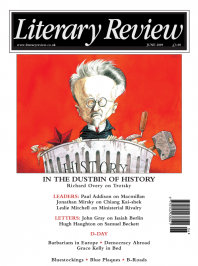Gillian Tindall
End of Days
Hodd
By Adam Thorpe
Jonathan Cape 336pp £17.99
Seventeen years ago Adam Thorpe produced a first novel of startling excellence. Ulverton evoked the history of a village from the mid-seventeenth to the late-twentieth century in a series of brilliant pastiches and cod documents. It is not to the credit of the Booker Prize judges of that year that they did not even shortlist it. Now, after producing several other novels located nearer to the present day, Thorpe returns, in Hodd, to the re-creation of distant times. He constructs a tour de force around an elusive thirteenth-century figure who may, or may not, have been the original of the fantasy Robin Hood we think we know and love. Let’s hope this year’s Booker lot are up to estimating this wonderfully subtle and layered book at its true worth.
No one with an idea of what the Merrie England of the Middle Ages was really like will be surprised to hear that Thorpe’s Hodd is, at one level, a psychopath, a plunderer and a murderer who cares not a scrap for the poor and will commit gratuitous

Sign Up to our newsletter
Receive free articles, highlights from the archive, news, details of prizes, and much more.@Lit_Review
Follow Literary Review on Twitter
Twitter Feed
Under its longest-serving editor, Graydon Carter, Vanity Fair was that rare thing – a New York society magazine that published serious journalism.
@PeterPeteryork looks at what Carter got right.
Peter York - Deluxe Editions
Peter York: Deluxe Editions - When the Going Was Good: An Editor’s Adventures During the Last Golden Age of Magazines by Graydon Carter
literaryreview.co.uk
Henry James returned to America in 1904 with three objectives: to see his brother William, to deliver a series of lectures on Balzac, and to gather material for a pair of books about modern America.
Peter Rose follows James out west.
Peter Rose - The Restless Analyst
Peter Rose: The Restless Analyst - Henry James Comes Home: Rediscovering America in the Gilded Age by Peter Brooks...
literaryreview.co.uk
Vladimir Putin served his apprenticeship in the KGB toward the end of the Cold War, a period during which Western societies were infiltrated by so-called 'illegals'.
Piers Brendon examines how the culture of Soviet spycraft shaped his thinking.
Piers Brendon - Tinker, Tailor, Sleeper, Troll
Piers Brendon: Tinker, Tailor, Sleeper, Troll - The Illegals: Russia’s Most Audacious Spies and the Plot to Infiltrate the West by Shaun Walker
literaryreview.co.uk